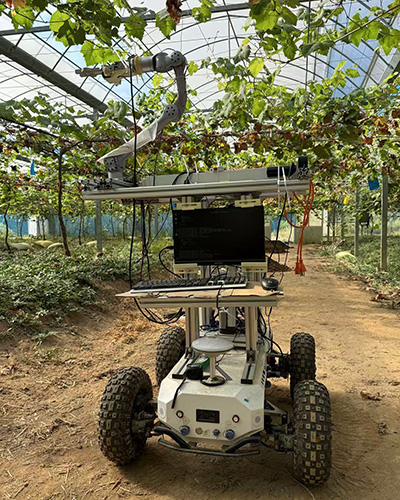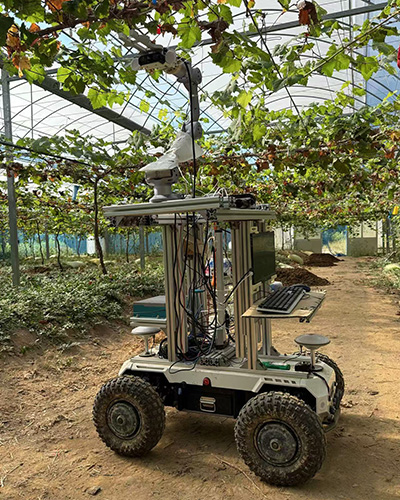II. Core Technology and Functions
1. Visual Recognition System
Equipped with a high-resolution camera and advanced image recognition algorithms. It can accurately identify the maturity, shape, size and position of fruits, and can accurately distinguish between fruits and background objects such as branches and leaves, branches and trunks even under complex natural lighting conditions, ensuring that only fruits with appropriate maturity are picked.
It can perform targeted recognition of different types of crops, such as apples, oranges, strawberries, etc., and continuously optimize the recognition accuracy through learning and database updates.
2. Harvesting Robotic Arm
Flexible robotic arm design with multiple degrees of freedom. It can precisely stretch, bend and rotate, mimicking the movements of human arms, and easily reach fruits in various positions.
The end of the robotic arm is equipped with a specially designed picking tool, which can be a flexible gripper (for delicate fruits such as strawberries) or a claw with a cutting function (for fruits with stalks such as apples) according to different crop types, ensuring that the fruits will not be damaged during the picking process.
3. Navigation and positioning system
Using GPS, inertial navigation and sensor fusion technology. The robot can autonomously navigate in the field, accurately move within the crop planting area, plan the best picking path, and avoid collisions with crop plants and other obstacles.
It can be combined with the farm's geographic information system (GIS) to achieve comprehensive coverage and efficient use of the entire picking area.
III. Performance characteristics
1. Efficient picking
Can work continuously without being affected by fatigue. Compared with manual picking, it greatly improves the picking speed, can complete large-area picking tasks in a short time, and effectively reduces the loss of fruits caused by untimely picking.
2. Precise operation
Picking actions with millimeter-level accuracy to ensure the integrity and quality of the fruits. It reduces the damage rate caused by improper human operation and increases the commodity value of agricultural products.
3. Strong adaptability
Can adapt to different terrain conditions, whether it is a flat orchard or a slightly sloping planting site, it can operate stably. And it can be adjusted according to different crop planting patterns and densities to meet the diverse agricultural production needs.
4. Intelligent monitoring and feedback
Built-in sensors monitor the robot's working status, power, picking quantity and other information in real time. These data can be transmitted to the farm management system through the wireless communication module, which is convenient for farmers to grasp the picking progress and robot operation at any time, and can timely alarm and locate the problem when a fault occurs.
Fourth, Advantages
1. Save labor costs
Reduce the dependence on a large number of manual picking labor and reduce labor costs, especially during the peak picking period, it can effectively alleviate the problem of labor shortage.
2. Improve agricultural production efficiency
By improving the picking efficiency and quality, the income of agricultural products is increased. At the same time, the use of robots can extend the picking cycle, so that more fruits can be picked at the best maturity.
3. Promote the modernization of agriculture
As advanced agricultural technology equipment, the application of harvesting robots helps to improve the level of intelligent agricultural production, promote the development of agriculture towards modernization and scale, and enhance the competitiveness of the agricultural industry.


